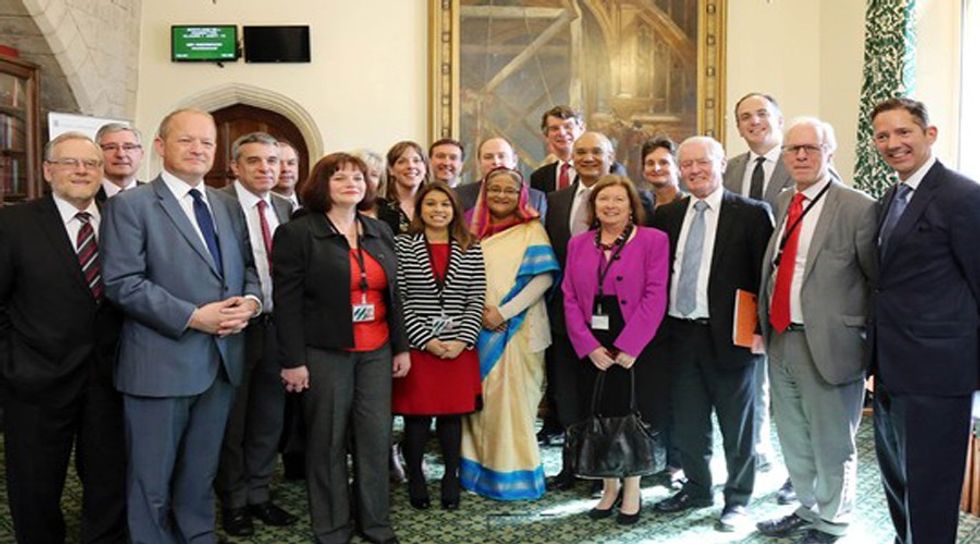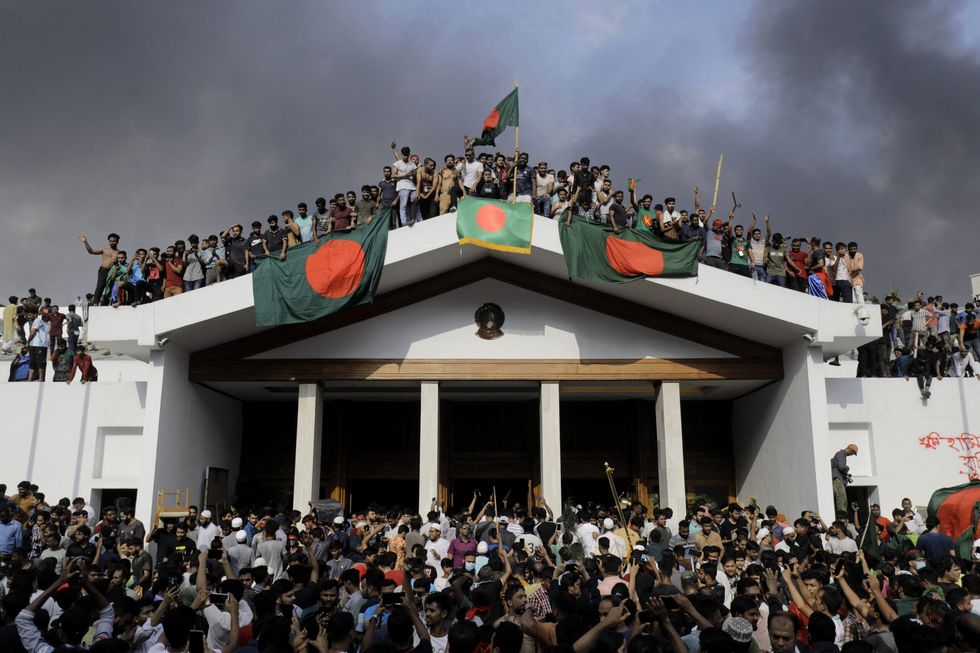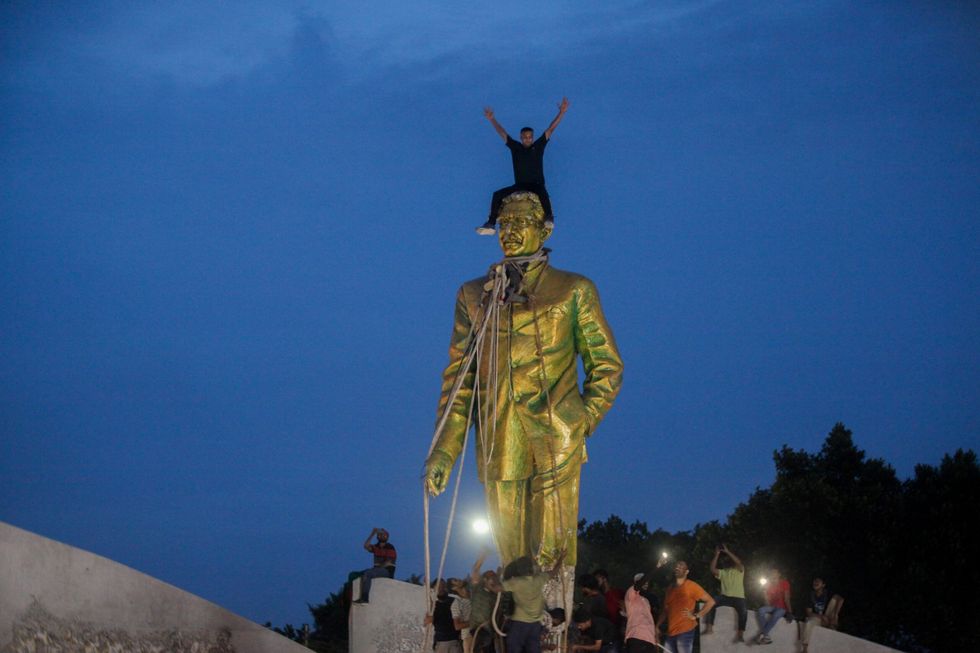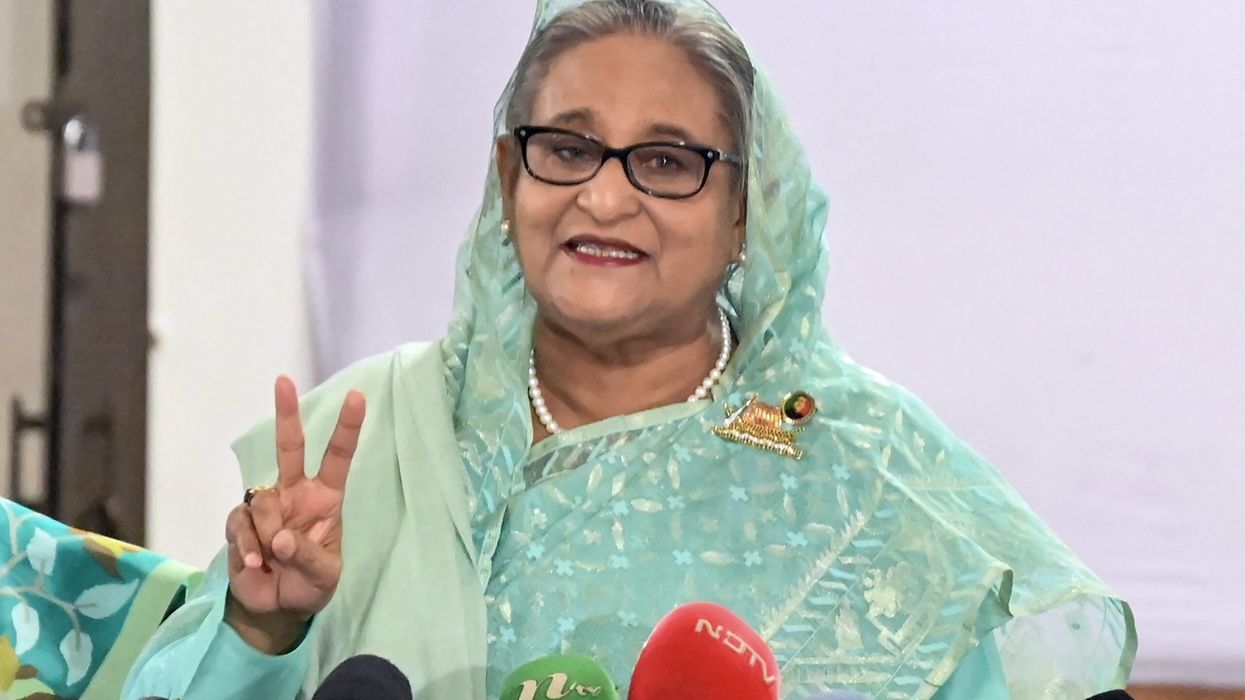AUGUST 15 is celebrated as India’s independence day but the date also marks a dark moment in the history of the subcontinent.
For it is on August 15, 1975, that a group of army officers assassinated Sheikh Mujibur Rahman, the founding father of Bangladesh and the new country’s first president.
He was killed at his home in Dhanmondi in Dhaka. Members of his extended family, estimated to be 36 in number and including Sheikh Mujib’s wife, brother, three sons and two daughters-in-law, were also butchered. His daughters, Hasina and Rehana, survived because they happened to be abroad.
Seized by a kind of bloodlust, demonstrators last week pulled down Sheikh Mujib’s statue in Dhaka in a way that has reminded many TV viewers in Britain of the similar toppling of Saddam Hussein’s likeness in Iraq after the Gulf War in 2003. But the former were ignorant of the history of their country – because without the campaign that Sheikh Mujib had led in 1970, there wouldn’t be a Bangladesh.

What has happened in Bangladesh is just the latest chapter in a young nation that’s soaked in blood.
The resignation of Hasina Wazed as prime minister and her decision to flee Bangladesh (with Rehana) confronts both India and Britain with almost impossible foreign policy challenges.
There was a time when Hindus and Muslims lived in harmony in the united province of Bengal. But Lord Curzon, viceroy of India from 1899-1905, sought to sow religious discord by partitioning the province along religious lines. That damage has never been undone.
At independence in 1947, East Bengal, having a predominantly Muslim population, became East Pakistan, but was separated by 1,000 miles of Indian territory from West Pakistan. West Bengal, with a predominantly Hindu population, remained part of India.
The differences between Punjabidominated West Pakistan and the Bengali-speaking East Pakistan triggered a campaign for greater autonomy under Sheikh Mujib. This escalated into a civil war in 1970-1971, which ended with the secession of East Pakistan and the birth of Bangladesh with Sheikh Mujib becoming head of government. Had it not been for the Indian armed forces, the West Pakistani army might well have prevailed.
Hasina has now found shelter in India, but sooner or later, she will want to make her home in London. This is partly because, in the early 1970s, the political battle for Bangladesh was planned in London. The UK is now estimated to have a Bangladeshi origin population of 700,000, which contains supporters of Hasina’s Awami League (AL) and also the rival Bangladesh Nationalist Party (BNP).

Hasina’s sister, Rehana, lives in London, as does her niece, Tulip Siddiq, the Labour MP for Hampstead and Highgate, who has been given a middle ranking job as economic secretary to the treasury by prime minister Sir Keir Starmer.
There is a happy photograph of Hasina visiting the Commons in 2015, accompanied by her niece.
The foreign secretary, David Lammy, who is probably unfamiliar with the “living bridge” between Bangladesh and the Bangladeshi diaspora in the UK, does not appear too keen to have Hasina in Britain.
He rushed out a statement: “The people of Bangladesh deserve a full and independent UN-led investigation into the events of the past few weeks.”
Although the Laureate Muhammad Yunus is the face of the new government in Bangladesh, the decisions are being made by the army, which previously has been in charge and may be unwilling to relinquish control.
Hasina lost the moral high ground with the killing of student protesters. But there will be real fears in London and Delhi that Islamic hardliners will seek to move unelected into the power vacuum caused by Hasina’s departure.

With mounting attacks on Bangladesh’s minority Hindu population, the omens are not encouraging.
In some ways, history is repeating itself. When Sheikh Mujib was released at the end of the Bangladesh war after spending nine months in a jail in West Pakistan, he arrived in London on January 8, 1972, on a RAF VC10.
Sheikh Mujib was welcomed to 10, Downing Street, by then prime minister Ted Heath and also by the Labour opposition leader, Harold Wilson.
On his way back to Dhaka, Sheikh Mujib stopped over in Delhi to thank the Indian prime minister Indira Gandhi, who had won the war against Pakistan.
Among high-profile Bangladeshis, the opinions of the two novelists, Monica Ali and Tahmima Anam, authors of Brick Lane and The Good Muslim, respectively, may count as Britain makes up its mind about developments in Bangladesh.
In the UK’s July 4 general election, there were 32 candidates of Bangladeshi origin, of whom four, all women and from the Labour party, were elected. Apart from Siddique, Rushanara Ali, Rupa Huq and Afsana Begum, all won.
It is worth mentioning that journalistic reputations have been made in Bangladesh. On June 13, 1971, an article in the Sunday Times exposed the brutality of Pakistan’s suppression of the Bangladeshi uprising. It forced the reporter’s family into hiding and changed history.
Written by Anthony Mascarenhas, a Pakistani reporter, it revealed the scale of the Pakistan army’s genocide to suppress its breakaway eastern wing in 1971.
Back in March 1971, Simon Dring, then a 26-year-old reporter with the Daily Telegraph, alerted the world to the Pakistani army’s massacre in East Pakistan with a front-page scoop, “Tanks Crush Revolt in Pakistan. 7,000 slaughtered.”
Nearly 200 journalists were forced to leave on the Pakistan Airlines shuttle service to Karachi (via Colombo). But Dring and AP photographer Michel Laurent hid in the hotel, went round Dhaka, and recorded the killings that had taken place.
At Dhaka University, said Dring, “I counted about 30 bodies... In the dormitories of Iqbal Hall, there was a lot of blood. I saw a student dead in bed. There were students lying in the lake... the army had set up mortars on top of the British Council and mortared the campus area, then they had gone in and just shot people… in the market area, about 200 yards of houses had been burned.
“There were people dead in front of the shops. …in the Hindu area, there was a very deliberate attempt to kill people. ...Razzakers (collaborators) pointing which houses were supporters of Sheikh Mujib and the occupants were taken out and killed... I met one police officer. He had 240 officers in his division. He found 30 of them, all dead.
“In the old part of the city I spoke to an old man … large areas had been burned, just razed to the ground. The tactic was Pakistan army would come to the end of the street. They would send a unit down shooting into the houses, followed by another unit that poured petrol, and they set fire to the shanty houses. And those inside were burnt alive. If they ran out, they were shot dead.
“In the Rajarbagh police lines, there were about 1,100 police officers housed in dormitories... they had fired incendiary devices into dormitories. Most of them were burned down… Michel and I realised that the scale of the massacre was really extensive... We estimate probably in the region of 7,000 people could well have lost their lives over that 24 hour period. And every place we went there was no indication of anybody shooting at the Pakistan army.
“This was clearly a deliberate attempt to kill people, to teach the people in this country a lesson, to say to them, ‘Forget about independence. This is united Pakistan, this is Pakistan’.”




